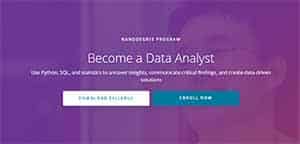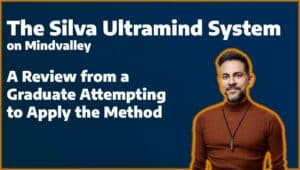Data analysis isn’t a new concept. People have been analyzing data since at least the 19th century, when Henry Ford measured the speed of every component in his new assembly line to see where it could be made more efficient. Analytics became even more critical in the 1960s when researchers began to use computers to help make business decisions.
Today, every business, regardless of size, location, and industry, is affected by data. According to the market research company International Data Corporation, 80% of organizations use data across multiple business functions, including product management, customer service, and manufacturing. That’s not surprising. Data analysts can help business leaders make better decisions by spotting trends and solving business problems, such as why sales dropped in a specific quarter.
Data analysts shouldn’t be confused with data scientists. Although both data analysts and data scientists work with data, what they do with that data differs. A data analyst helps business leaders with decision-making by finding answers to a set of questions using data. On the other hand, data scientists generates their own questions, designs experiments, and builds new algorithms. Many data scientists start off as data analysts. If you’d rather study data science from the get-go, check out our review of the 11 best data science courses on the market.
If data analytics seems right up your street, keep on reading for the best data analytics courses currently on offer. The following online data analytics courses will teach you everything you need to know to become a successful data analyst — at less than a quarter of the cost of a traditional degree.
In reality, there’s no need to be concerned if you don’t have a degree and want to become a successful data analyst. As of 2022, the majority of data analyst jobs are no degree jobs, meaning that they will not require a degree for you to be eligible. Taking a high-quality online data analytics course allows you to learn everything you’ll need to thrive, and countless data analysts with no formal education have been able to get high-paying positions.
These are our picks for the best data analytics course.
Best Data Analytics Courses
Best Overall: Data Analyst Nanodegree (Udacity)
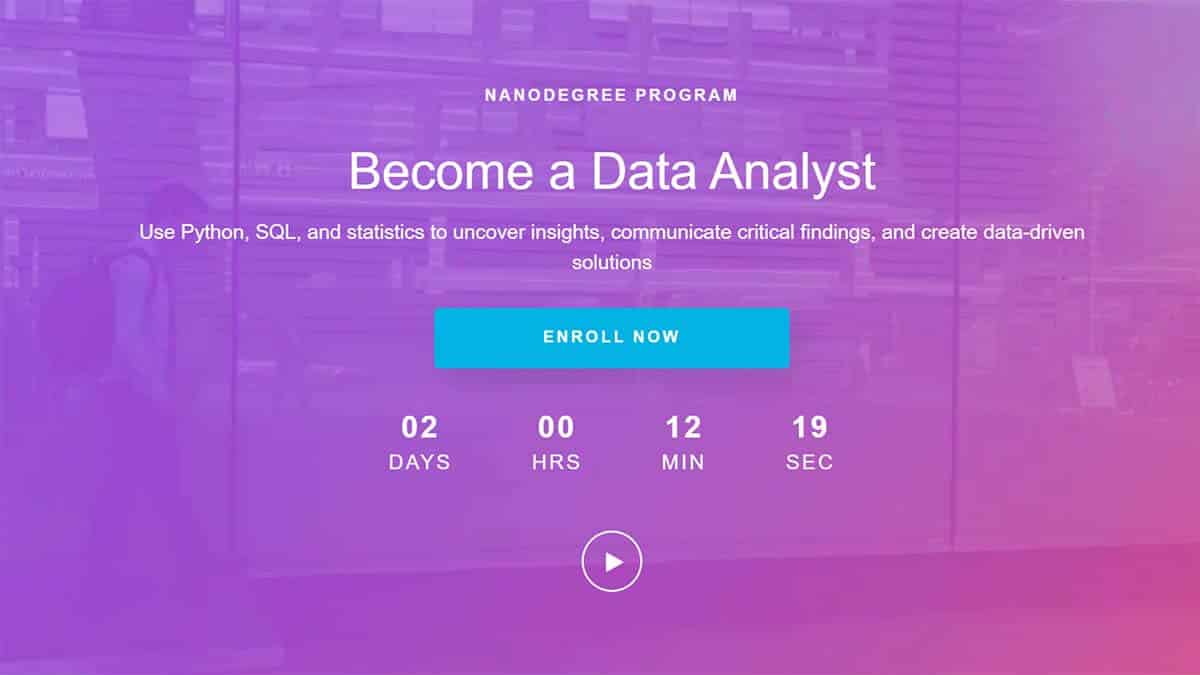
- Focuses on hands-on projects and practical scenarios
- Personalized mentor feedback
- Career support services included
- Superb for learning Python-based data analysis
Cons
- Basic knowledge of Python and SQL languages required
Udacity’s Data Analyst Nanodegree will teach you all of the knowledge, skills, and tools needed to build a career in data analytics. In addition to covering both theory and practice, the program also includes regular 1-on-1 mentor calls, an active student community, and one-of-a-kind career support services.
This program is best suited for students who have working experience with Python (and in particular NumPy and Pandas) and SQL programming. However, don’t be discouraged if you lack these prerequisites. There’s also a similarly structured beginner-level Nanodegree, “Programming for Data Science in Python” (as well as a “Programming for Data Science in R” Nanodegree if you need to focus on the R language), that is the perfect pick for you if you don’t meet the prerequisites for this program. The beginner-level program covers just what you need: the basics of Python programming from a data science perspective.
As for the syllabus of the Data Scientist Nanodegree, it is split into the following four courses, each of which includes practical projects that you can demonstrate to future employers:
- Introduction to Data Analysis. Here, students have to explore weather trends and investigate one of Udacity’s curated databases using Numpy and Pandas.
- Practical Statistics. Here, students have to use data analytics and statistical analysis methods to make sense of large data sheets and report the results.
- Data Wrangling. Here, students learn how to use Python for data wrangling purposes (gathering data, assessing its relevance, cleaning it up, and preparing it for analysis).
- Data Visualization with Python. Here, students learn to use Python for putting data visualization principles into practice.
In this program, the lesson topics are all handpicked and the syllabus contains only the most useful and practical topics for working as a data analyst. It also covers some of the most common tools for data analytics, like R, Python, and Tableau, and forces you to apply concepts you just learned to real-world projects inspired or given by companies in the industry.
For these reasons and more, we ranked Udacity’s Data Analyst Nanodegree as the #1 best online data analytics course. It’s not easy, but it’ll help you learn the fundamentals of data analysis better than any other class.
Best Overview: Become a Data Analyst (LinkedIn Learning)
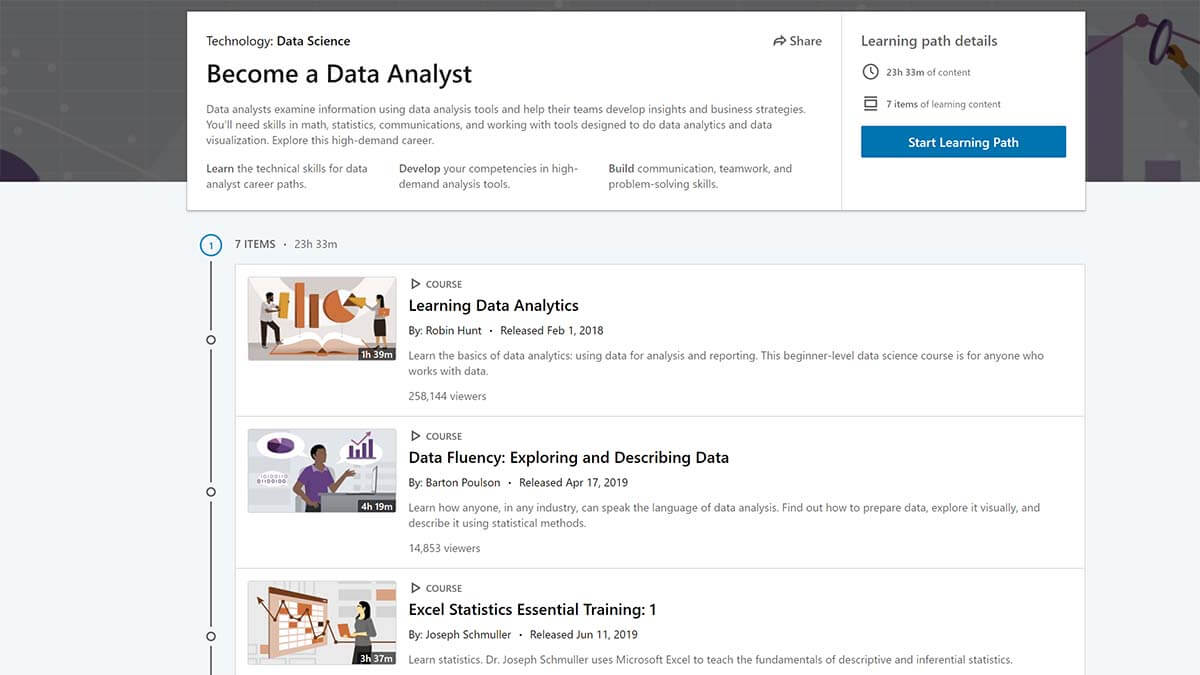
- Provides a good overview over the topic of analytics
- Can easily be completed within the free LinkedIn Learning 30-day trial
- Beginner-friendly
- No prerequisites
- Includes quizzes
Cons
- No hands-on projects
- Needs to be complemented with a more in-depth course
Become a Data Analyst on LinkedIn Learning is a beginner-oriented data science “learning path.” Learning paths are playlists of related video courses on a particular topic or career.
This particular path consists of seven courses: Learning Data Analytics, Data Fluency: Exploring and Describing Data, Excel Statistics Essential Training: 1, Learning Excel: Data Analysis, Learning Data Visualization, Power BI Essential Training, and Tableau Essential Training (2020.1). Each course varies in length. However, most courses are between two and four hours long so you can complete the entire path from start to finish in about 24 hours.
There are no prerequisites to starting this learning path. In fact, you don’t even need to know what data analysis is. The course begins by defining data analysis before teaching you how to identify, interpret, clean, and visualize data.
The curriculum is taught via video by six different instructors, all of which are experts in the industry. Some courses include quizzes and every course has a Q&A section where you can ask the lecturer questions on the course. The only downside? There are no hands-on projects.
All in all, Become a Data Analyst by LinkedIn Learning is another one of the best data analytics courses for understanding essential data analysis skills. If you’re unsure whether data analysis is what you really want to do, this course will help you figure it out.
Best for Bite-Sized Learning: Data Analyst with R (DataCamp)
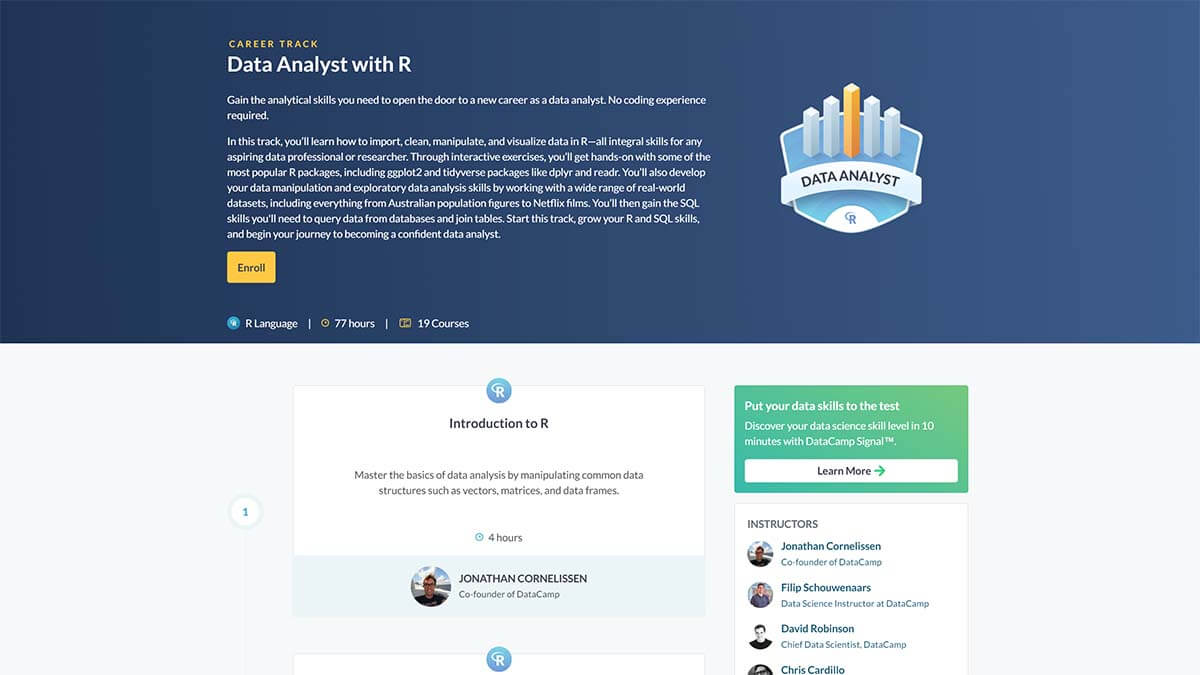
50% off Unlimited Data and AI Learning (expires 28 March 2024)
- No prerequisites
- Courses picked by industry experts
- Interactive exercises
- Chance to work with real-world datasets
DataCamp’s Data Analyst with R Career Track consists of 19 data science analytics courses handpicked by industry experts to help you start a new career in data science. Since each course is about 4 hours long, the entire track should take about 77 hours to complete. At the end of this track, students should be able to manipulate and analyze data using R.
The track is easy to follow. It helps that each course is split into several smaller courses, which are divided into “chapters.” The curriculum is taught through videos and interactive exercises.
In addition to learning how to use some of the most popular R packages, like ggplot2 and tidyverse, students also gain SQL skills for querying a database and joining tables. Moreover, students get to work with real-world datasets, such as Australian population figures and U.S. baby names.
The courses are taught by 15 different instructors, including Jonathan Cornelissen, the co-founder of DataCamp. There are no prerequisites to starting this Career Track.
You can’t beat DataCamp’s Data Analyst with R if you’re looking to change career but don’t have a lot of time each day to spend studying. Divided into bite-sized learning chunks, this Career Track is hands down one of the best data analytics courses. It’ll teach you everything you need to know to get started in the data science field.
Best for Employability: Data Analytics Bootcamp (Springboard)
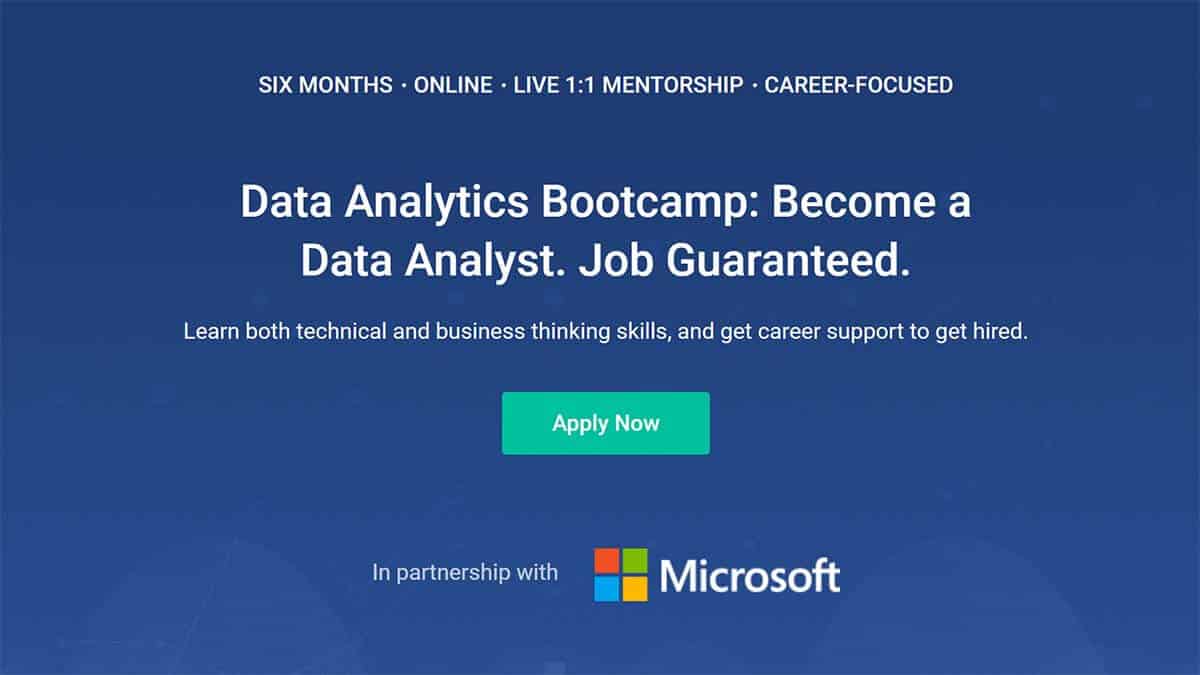
- Job guarantee
- 1-on-1 mentor support
- 2 capstone projects
- Unlimited career coaching
Cons
- High price tag
- While most students have a positive experience, the format is not suitable for everyone – make sure you read the fine print and make full use of 7-day free trial to evaluate the course
Designed by Springboard in partnership with Microsoft, Data Analytics Bootcamp is a six-month career-focused program with a job guarantee. The bootcamp goes over fundamental business statistics concepts and advanced analysis techniques and teaches students how to use analytics and visualization tools like Excel, Python, SQL, Tableau, and Microsoft Power BI.
Throughout the course, students complete several small projects and two Capstone Projects sourced from Harvard Business School and Khan Academy.
The entire course takes about 320 hours, or 6 months, to complete. Most students dedicate between 15 and 20 hours a week to the course. Each student also receives unlimited mentor calls and 50+ hours of career support.
Not everyone will be accepted into this program, though. Students are expected to be fluent in English and have two years of professional experience working with Microsoft Office or G-Suite. Students should also possess critical thinking and problem-solving skills. If you don’t meet the criteria, Springboard has a free Intro to Business Analytics course that’ll bring you to the required level.
Since Springboard provides a job guarantee, you don’t have to worry about wasting hours of your time studying only to end up staying in your current job because you can’t land a job in the industry. Out of 1,730+ students, there’s been only one job guarantee refund since 2016. Moreover, most Springboard students have seen a salary increase of more than $25,000.
Best University Course: Data Science Specialization (Coursera x Johns Hopkins University)
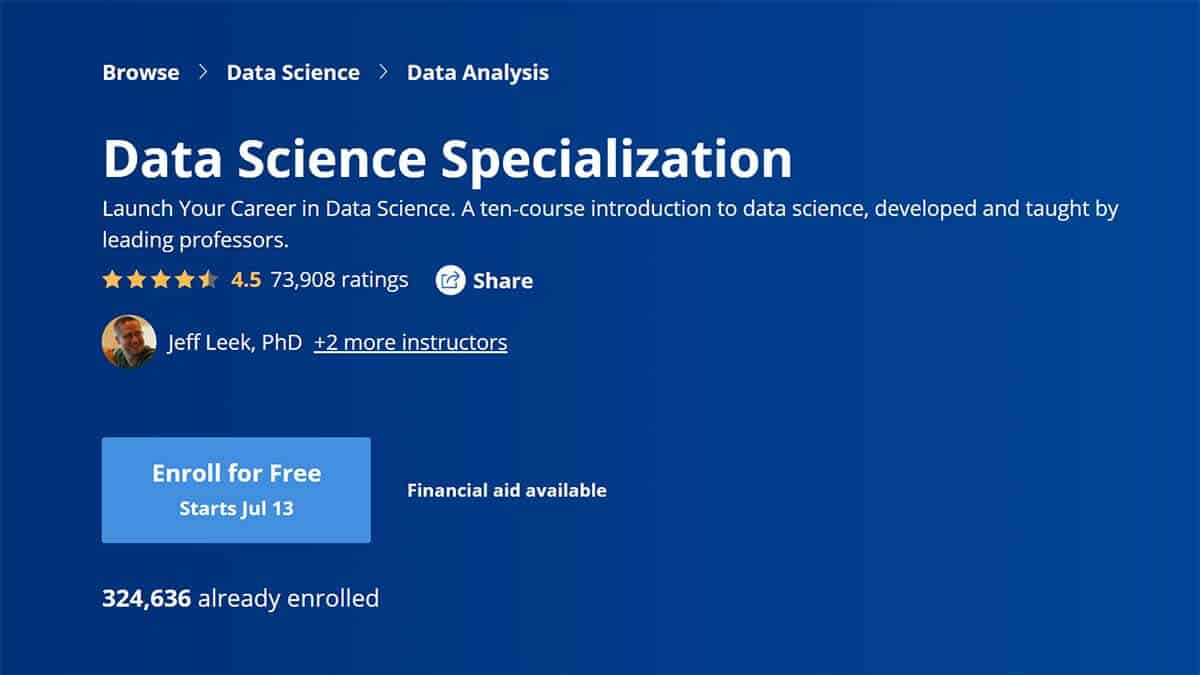
40% ($140 USD) off your first year of Coursera Plus Annual (expires 2 December 2024)
- Audit course content for free
- 7-day free trial
- Capstone project
Cons
- Requires familiarity with Python and regression
Data Science Specialization offered by Coursera, together with the prestigious Johns Hopkins University, is a ten-course program that helps you understand the whole data science pipeline at a basic level. Although anyone can sign up for this course, students should have beginner level experience in Python and some familiarity with regression.
The curriculum is taught through videos and complementary readings. Student knowledge is tested via auto-graded practice quizzes and peer-graded assignments. The program culminates with a hands-on project that gives students a chance to create a usable data product.
According to Coursera, most students can expect to finish the program in about 11 months, as long as they spend 7 hours a week studying. Since Coursera charges a monthly fee, there’s a strong incentive to complete the Specialization as quickly as possible. Students can also choose to view course content for free, but this means that they’ll miss out on the capstone project and course certification.
If you’re not sure whether this course is right for you, there’s a 7-day free trial. Coursera also offers financial aid to students who can’t afford the course fee.
Coursera’s Data Science Specialization is, without a doubt, one of the best data analytics courses. According to Coursera, 43% of students that have taken this course started a new career. And 19% received a pay increase or promotion. However, to make the most of this course, students should have experience with Python programming language and a familiarity with regression.
Best for Business Analytics: Business Analytics Specialization (Coursera x Wharton)
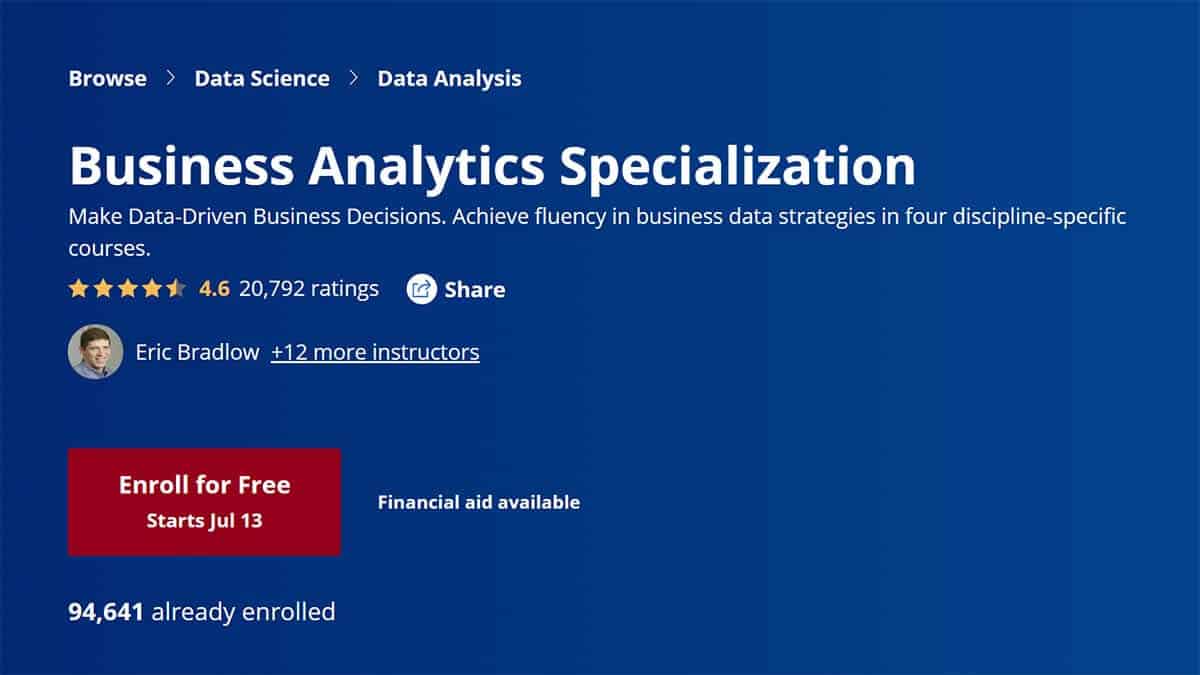
40% ($140 USD) off your first year of Coursera Plus Annual (expires 2 December 2024)
- Capstone project
- No prerequisites
- Content is auditable for free
Created by the Wharton School of the University of Pennsylvania and hosted on Coursera, the Business Analytics Specialization is divided into four discipline-specific courses (customer, operations, people, and accounting analytics). The final, fifth, course, is dedicated to a capstone project.
The Specialization is taught through videos and readings. Your knowledge is tested via compulsory quizzes. You can also participate in discussion forums. At the end of the course, students complete a Capstone Project designed in conjunction with Yahoo. The entire Specialization takes about 40 hours to complete, which means that students can finish the program in just six months if they spend three hours a week learning.
No prior knowledge of business analytics is required to enroll in this course. However, students need to have access to a full-featured version of Microsoft Excel and a basic understanding of Microsoft Excel’s functions (take a look at our review of the best Excel courses if you need to brush up on your Excel skills).
If you want to be able to create new business strategies using data, you won’t regret taking this Specialization by the Wharton School of the University of Pennsylvania.
Best for Communicating Data: Excel to MySQL - Analytic Techniques for Business Specialization (Coursera x Duke University)
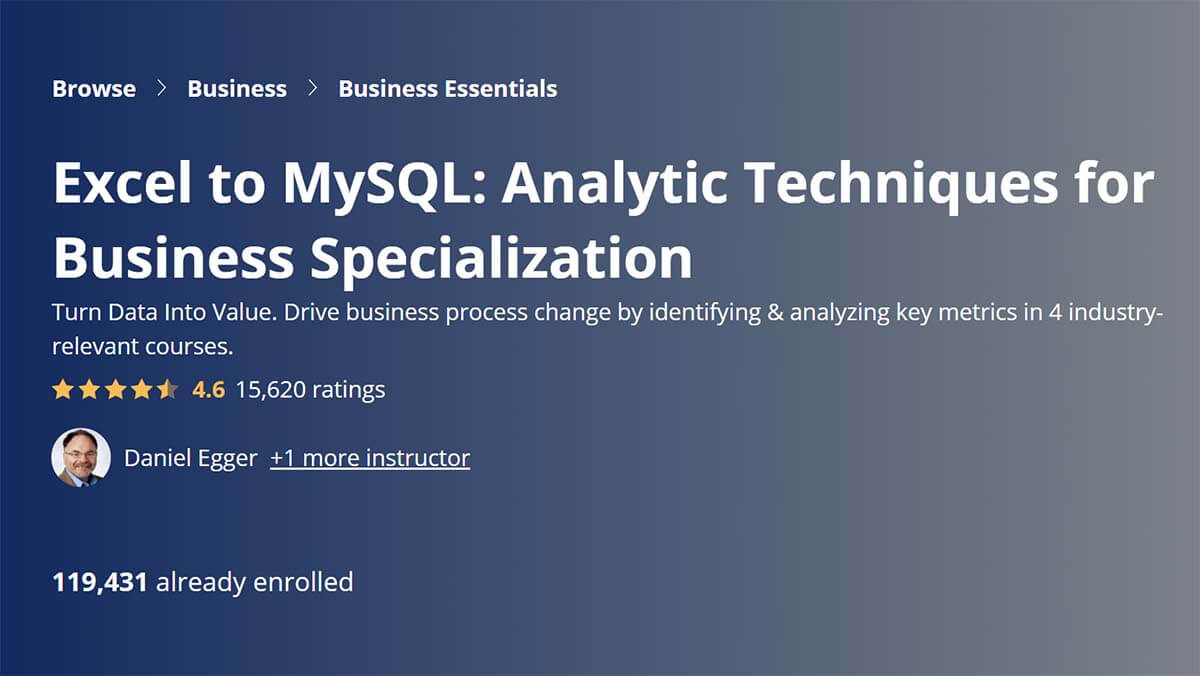
40% ($140 USD) off your first year of Coursera Plus Annual (expires 2 December 2024)
- Suitable for beginners
- Plenty of hands-on projects
- Potential input from data scientists at Airbnb
Cons
- Long and time-intensive course
Offered by Duke University and available on Coursera, the Excel to MySQL: Analytic Techniques for Business Specialization is a beginner-friendly course that teaches students how to obtain as much information as possible from the data they already have.
The program is divided into five courses. You start off by learning best practices for using data analytics to make a business more competitive before moving on to classes on Excel, Tableau, and MySQL.
Each course ends with a project. For example, at the end of the third course, you have to give a five-minute presentation on how a business can increase the number of tests users complete. The final course is dedicated to the Capstone Project, which is sponsored by Airbnb. As part of this project, students have to make a recommendation on how a business can improve its profits. Every year, 10 students will get feedback on their project from data scientists working at Airbnb.
Although no prior experience with Excel is needed, students will need to have access to Microsoft Excel 2007 (or a more recent version). Students that dedicate five hours a week to the program can expect to complete this course in about seven months.
It doesn’t matter whether or not you have experience with statistics, computer science, or business. This course will teach everyone something new.
Best Crash Course: Big Data Analytics with Tableau (Pluralsight)
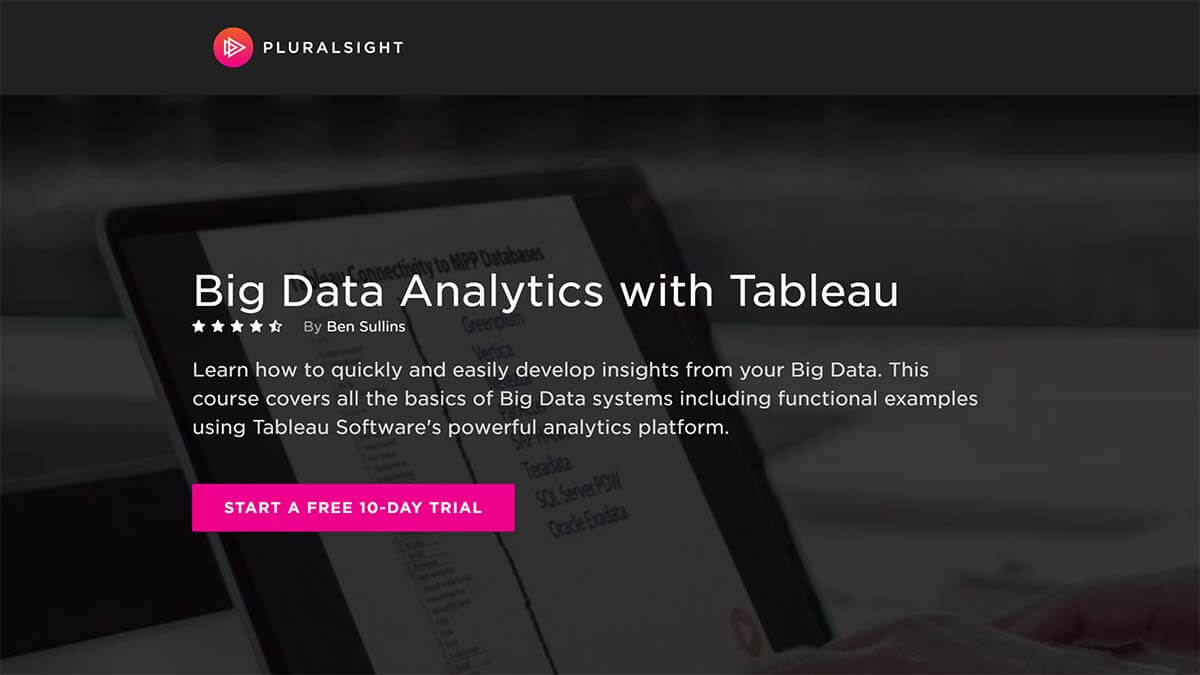
- Bite-sized chunks of content
- Focuses on Tableau software
- Only 4 hours long
Cons
- Some prior experience required
Pluralsight’s Big Data Analytics with Tableau will not only give you a better understanding of big data but will also teach you how to access big data systems using Tableau Software. The course covers topics like big data analytics and how to access and visualize big data with Tableau.
The course is taught by Ben Sullins, who has 15 years of industry experience and has offered consulting services to companies like Facebook, LinkedIn, and Cisco. Sullins passes on his knowledge to students through bite-sized chunks of content. As such, students can personalize their learning to suit their individual requirements. You can finish the course in just a day or take your time and complete it over the course of a week or two.
This course isn’t necessarily for beginners. You’re expected to have some experience with data analytics. If you’re a complete beginner, consider taking Data Analysis Fundamentals with Tableau, another course authored by Sullins.
Tableau is one of the most popular data visualization tools. Pluralsight’s Big Data Analytics with Tableau will help you become technically fluent in using this software.
Good Course Alternative: The Data Science Course 2022: Complete Data Science Bootcamp (Udemy)

New customer offer! Top courses from $14.99 when you first visit Udemy (expires 31 March 2024).
- No prior experience required
- 30-day money-back guarantee
Cons
- Some complex topics could be explained better
Available on Udemy, Data Science Course 2022: Complete Data Science Bootcamp is a comprehensive data science course that consists of 471 lectures. The lectures include almost 30 hours of on-demand video, 90 articles, and 154 downloadable resources. While the course is not new and we first covered it back in 2020, it has been updated for 2022 with new learning materials.
As part of this course, students can expect to learn in-demand data science skills, such as Python and its libraries (like Pandas, NumPy, Seaborn, and matplotlib), machine learning, statistics, and Tableau.
Although the course might seem a bit overwhelming at first glance, it’s actually well-structured and requires no prior experience. All you need to get started is access to Microsoft Excel.
The course will set you back a few hundred dollars. However, since Udemy runs generous discounts fairly regularly, you can get the course for under $20. Either way, this course is a steal, especially considering that you get full lifetime access to it and any future updates. Note, however, that although it is named a “bootcamp”, this follows a more traditional course structure and does not feature the 1-on-1 mentoring that is common in bootcamps.
Overall, Udemy Data Science Course 2022: Complete Data Science Bootcamp covers a wide range of topics but doesn’t go too deep or get too practical. All in all, it’s a fantastic general introductory course to data science.
Good Bootcamp Alternative: Data Analytics Immersion (Thinkful)
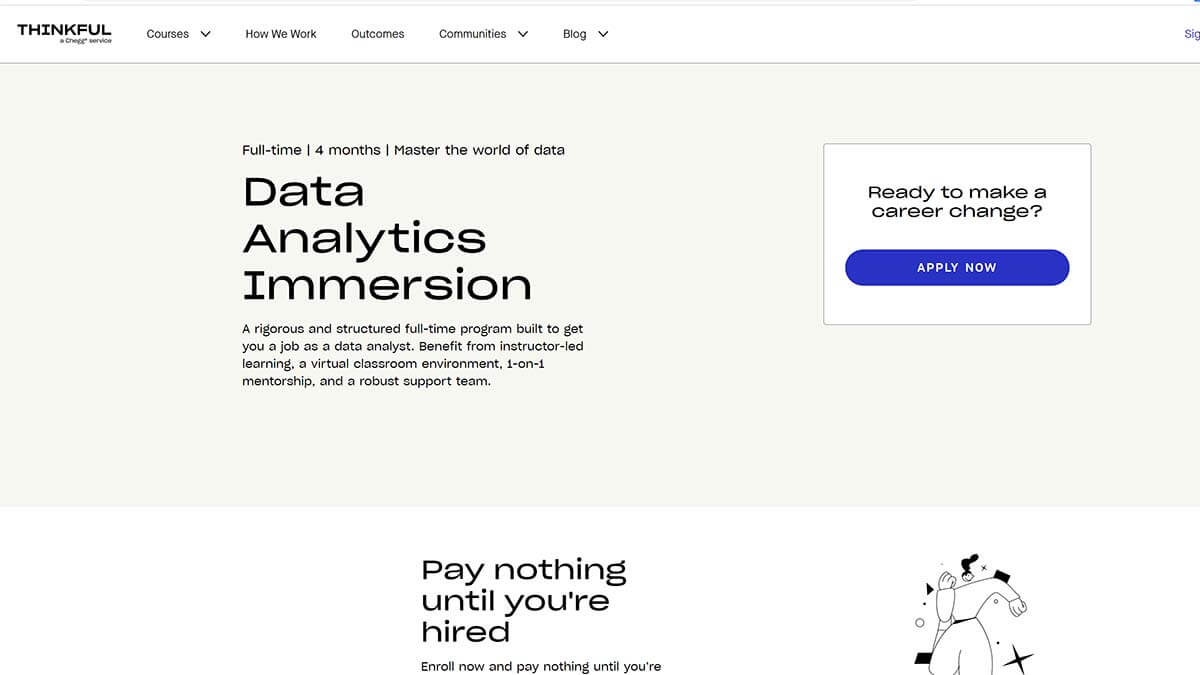
- No prerequisites
- 1-on-1 mentorship
- Don’t have to pay until you’re earning $40,000 a year
Cons
- Expensive and issues reported with payment model
Thinkful’s Data Analytics Immersion is an intensive full-time training program. Although one of the more expensive data analytics courses out there (it costs $12,250), it promises to take you from beginner to expert in just four months. However, students are expected to spend between 50 to 60 hours a week studying.
Once you sign up for the course, you receive a customized schedule to help you stay on track. The curriculum consists of seven areas: Excel Foundations, Storytelling with Data, SQL Foundation, Tableau, Business Research, Python Foundations, and Capstone Phase. During the Capstone Phase, students not only get to build a final project but also complete two culture fit interviews.
There are no lectures or seminars. Instead, the course material is text-based. As such, the program might not suit individuals who prefer video instruction. That being said, every student gets a personal mentor who can answer questions about everything related to the course. You also get a career coach and an academic success manager. The latter can support you during tough times like if you get behind and need your deadlines pushed back.
There are no prerequisites for taking this course. But the admissions process is quite lengthy and includes a “fit interview” to see whether your schedule and learning style align with the course. If accepted, you can choose to pay nothing until you’re working as a data analyst and earn at least $40,000 a year.
Thinkful’s Data Analytics Immersion program can guide you to your dream career, as long as you’re willing to put in the time to study.
